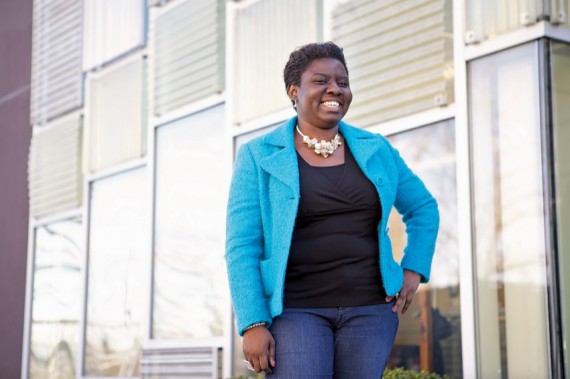Answering a calling to support survivors

It was a 3 a.m. phone call that led Indira Henard ’03 to her life’s work. The year was 2007, and Henard was an aide for then Senator Barack Obama as well as a special assistant on his presidential campaign. She was also volunteering for the DC Rape Crisis Center, one of the nation’s oldest nonprofits dedicated to eradicating sexual violence.
In the middle of the night, the center called Henard to the hospital to support a woman who had been raped. Though she had been trained for the work, this was Henard’s first experience as a victim advocate.
What followed were seven grueling, emotional hours of waiting, interviews and tests. “That was a significant turning point for me,” she says. “I knew I wanted to make a difference.”
In the years since that pivotal phone call, Henard—now the rape crisis center’s director of advocacy—has made a very big difference in the lives of sexual assault survivors in the D.C. area and beyond. As part of her job, she partners with state and local officials to coordinate public policy initiatives and creates spaces for survivor-led advocacy programs.
“We live in a culture that perpetuates violence against women,” she says. In response to an increase in the number of sexual assaults reported on campuses, Henard educates college administrators around compliance regulations in this area. She also provides best-practice frameworks for the White House Task Force to Protect Students From Sexual Assault.
Last year, Henard helped facilitate passage of the Sexual Assault Victims’ Rights Amendment Act (SAVRAA), legislation that improves how the Metropolitan Police Department in D.C. handles sexual assault cases and treats survivors.
“SAVRAA is good policy, helping to deliver what every survivor wants, which is self-determination,” says Henard. Among other mandates, the amendment gives sexual assault survivors the right to have an advocate present during hospital forensic exams—echoing the work Henard performed as a volunteer for the rape crisis center.
The passage of SAVRAA was a survivor-driven effort, and Henard ensured that voices not historically factored into policy were heard, says Sherelle Hessell-Gordon, DC Rape Crisis Center director, who calls Henard a “bright light.” More than 80 women and men shared their stories during the process.
In March, the Academy of Criminal Justice Sciences presented Henard with a national Victim Impact Award for her leadership in the passage of SAVRAA. “Her knowledge of the legislative process played an instrumental role in getting the policy passed,” says Heather Pfeifer, the awards committee chair.
A self-professed “political junkie,” Henard majored in political science and minored in legal studies at Wheaton. She earned a master’s degree in political science at the University of Chicago in her home city.
“I have always made my best decisions when I followed my heart,” Henard says.
It was former Wheaton president Dale Marshall who encouraged Henard to act on her dream of moving to D.C. “Dale and I had a fabulous relationship. It’s one of the things I treasure most about my Wheaton education,” she says.
About her two years with the Obama campaign, Henard says, “It was a historic time, and through the high pressure I learned to bring my best self forward.”
She is currently working on her master of social work at Catholic University, “to provide an intellectual framework to my life’s work.”
Though Henard has had many successes in her career, she is most proud of her everyday victories, when she can help a survivor on her journey. “There is no greater feeling than being with someone from her darkest to her brightest moment.”
Photo by Rebecca Hale ’99
